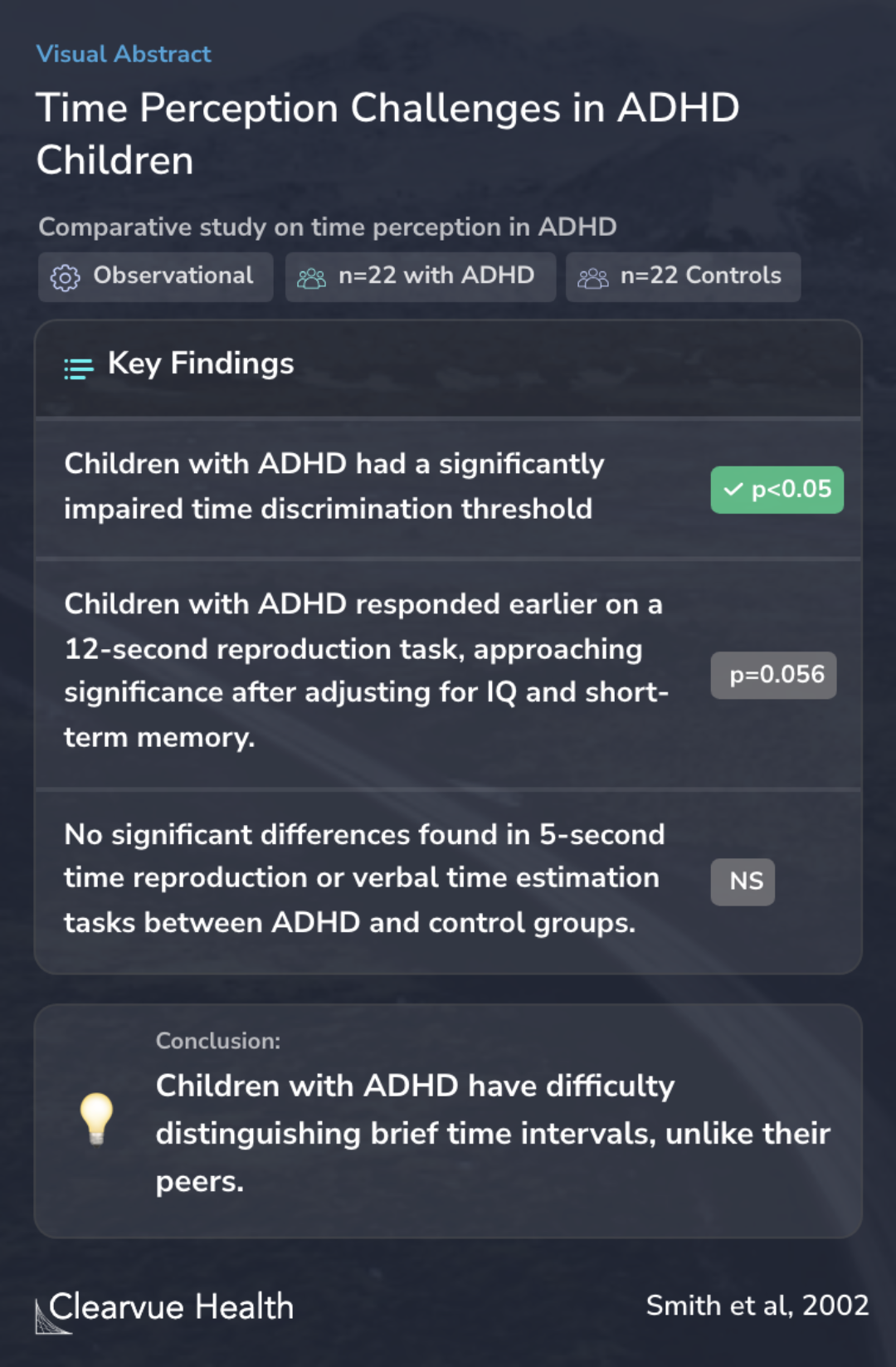Evidence for a pure time perception deficit in children with ADHD
Time Perception Challenges in ADHD Children
Anna Smith, Eric Taylor, Jody Warner Rogers, Stuart Newman, Katya Rubia

Objectives
The objective of this study centers on exploring the temporal processing abilities of children with ADHD. Previous research identified deficits in time reproduction, time production, and motor timing tasks among these children, suggesting a problem with temporal processing. This could be either a primary issue or secondary to core executive dysfunctions. The current study aims to delve deeper into this area by examining the skills of hyperactive children in time estimation, utilizing a variety of time perception tasks across different temporal domains.
Deficits have been found previously in children with ADHD on tasks of time reproduction, time production and motor timing, implicating a deficit in temporal processing abilities, which has been interpreted as either secondary or primary to core executive dysfunctions. The aim of this stu...
Methods
The methodology involved testing time estimation using a verbal estimation task of 10 seconds and acquiring time reproduction data for two intervals: 5 and 12 seconds. Additionally, a temporal discrimination task was conducted to pinpoint the minimal time interval discernible by participants, typically around 300 milliseconds. This study compared 22 children diagnosed with ADHD against 22 healthy children, who were matched in terms of age, handedness, and working memory skills.
Time estimation was tested in a verbal estimation task of 10 seconds. Time reproduction was also acquired for two time intervals of 5 and 12 seconds. A temporal discrimination task aimed to determine the idiosyncratic threshold of minimum time interval (in milliseconds) necessary to dist...
Results
The results revealed that children with ADHD had a notably impaired time discrimination threshold. They needed time intervals to be approximately 50 ms longer than control children to distinguish between them. In the 12-second time reproduction task, children with ADHD tended to respond earlier, a finding that almost reached significance after adjusting for IQ and short-term memory. However, no significant differences were observed in the 5-second time reproduction or verbal time estimation tasks between the ADHD and control groups.
Children with ADHD were significantly impaired in their time discrimination threshold: on average, time intervals had to be 50 ms longer for the hyperactive children in order to be discriminated when compared with controls. Children with ADHD also responded earlier on a 12-second reprodu...
Conclusions
In conclusion, this study highlights that children with ADHD face challenges in distinguishing brief time intervals, a contrast to their peers. Their performance on time reproduction tasks, which require a strong grasp of impulsiveness and attentional processes, was poorer. These findings suggest a perceptual deficit in time discrimination among ADHD children, particularly in brief durations differing by several hundred milliseconds. Such a temporal perception deficit, in the range of milliseconds, could potentially impact other functions like perceptual language skills and motor timing. This study's conclusions are supported by similar research, underscoring the broader context and significance of these findings within the field.
The findings suggest that children with ADHD perform poorly on time reproduction tasks which load heavily on impulsiveness and attentional processes and they also suggest that these children may have a perceptual deficit of time discrimination, which may only be detectable in brief durat...
Context
The findings of this study add to our understanding of ADHD and time perception in children. Previous research by Barkley et al. in 1997 highlighted that children with ADHD struggled with time reproduction, especially under distraction, and medication did not improve accuracy. This suggests an inherent impairment in time perception among ADHD children, not rectified by common medications.
Toplak et al.'s 2005 study further revealed that ADHD participants had higher thresholds in duration discrimination tasks, particularly in visual tasks of 1000 ms. These findings indicate that ADHD may involve impairments in basic timing mechanisms, affecting the perception of time. Together, these studies, along with the current research, paint a comprehensive picture of the challenges faced by children with ADHD in perceiving and processing time.